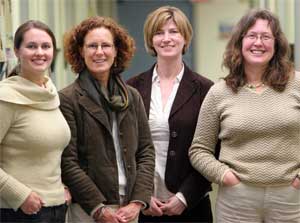 |
| Earthspeak volunteers at Dalhousie include Laura Boland, Cindy Dobbelsteyn, Raylene Delorey and Elizabeth (Mandy) Kay-Raining Bird. (Pearce photo) |
Having a child born with a cleft lip and palate can be daunting, even when things like access to basic insured medical service is guaranteed.
Now imagine the challenge of having a child born with a cleft lip and palate in countries where access to medical and related services is severely limited.
Raylene Delorey and Cindy Dobbelsteyn, speech-language pathologists with the Nova Scotia Hearing and Speech Centres and faculty members in the School of Human Communication Disorders (SHCD) at Dalhousie, have participated in international missions with a volunteer medical organization called Operation Smile.
This organization has performed thousands of cleft lip and palate surgeries that have dramatically transformed the lives of babies, children and adults around the world who may otherwise have gone untreated. The pair have traveled to Bolivia, Ecuador, Honduras, Kenya, Romania and the Philippines as part of a multi-disciplinary team of international volunteers.
|
The challenges faced by individuals born with cleft palate don't end with surgery. Individuals continue to face many speech difficulties, even after the physical defect has been corrected. Sounds and words they had learned to pronounce incorrectly often have to be relearned. And this is where Earthspeak comes in.
The women have travelled to Ecuador twice in the past two years as part of Earthspeak. Their work focuses upon meeting the speech and language needs of patients with cleft palate after they've had surgery.
"Before Earthspeak, there were no real supports in place for individuals to receive speech treatment post-surgery," says Ms. Dobbelsteyn, who is the Dalhousie group's team leader. "In many cases, it's like the children have to learn a whole new way of speaking."
In addition to providing support directly to families, Earthspeak teaches local health care workers, teachers and parents about the causes, treatments and local resources for cleft lip and palate. "We teach members of the health community, teachers and parents to be a second level of support. We show them how to be speech teachers."
Students from the School of Human Communication Disorders at Dalhousie University also take part in the Earthspeak program, gaining valuable hands-on knowledge and life experience as well. On the group's last mission to Ecuador, third-year Speech-Language Pathology (SLP) student Kelly Root and second-year SLP student, Laura Boland, participated in clinical speech and language assessments, teaching, and intervention activities and spent time interacting with the children. In addition, several Dalhousie students are now participating in research evaluating outcomes of the treatment.
Even members from the local Halifax community became involved with the mission. Students from Sacred Heart School of Halifax created and purchased materials for the children in Ecuador.
The group says one of the most rewarding aspects of returning to the same country year after year is being able to track the progress of the children they've worked with.
"Families sacrifice so much to participate in this program," says Ms. Delorey. "Many of them are living in extreme poverty and some of them have to travel for many miles just to get this treatment. It's gratifying to meet these children again and to see them doing well."
